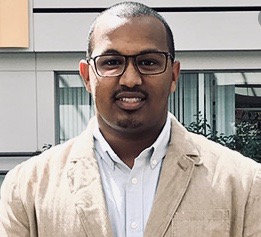SENAY EMMANUEL WRITES — I am a fourth-year undergraduate student at a well-known university in Los Angeles, California. I am set to graduate in a few months and move to Washington D.C. to work at a non-profit. Life was all planned and prepared, and as commencement neared, I gradually filled with excitement for the future.
When I first heard initial reports of what we now refer to as COVID-19, I dismissed it as a disease that would come and go, much like Ebola in 2014 or the 2009 Swine Flu pandemic. I didn’t realize that it would impact life in the United States, a highly privileged country that goes fairly undisturbed by global crises.
To Americans, these trying times can make us feel isolated, scared, and alone, mostly because we are used to our predictable and safe environments — unlike those who live in unstable or war-torn areas. But what we are all doing to adapt to and mitigate this pandemic is actually a universal experience. That being said, the way in which I am impacted by this virus is likely not the same as my next-door neighbor.
Every day, I am worried about my mother who is older and has existing health issues and my sister who is immunocompromised. I worry about my friends and family. I worry about those who are experiencing homelessness who have nowhere to go — or those in nursing home facilities who are at extreme risk. I worry about kids at shut local schools who rely on school lunches for their meals, much as I did when I was younger. I worry about the world and about myself because this whole crisis came at a time that wasn’t particularly rosy.
I am filled with negative emotions when I observe the way in which some people are acting in response to this developing situation. I see images of people buying disinfecting wipes, toilet paper, and other necessary goods in bulk and reselling them to earn a profit. I see friends struggling to find flights back home from Europe in light of President Donald Trump’s entry ban. I see events, concerts, conferences, performances, classes, meetings, all being cancelled in quick succession. It almost seems like we are preparing for war and in a way, we are.
Despite this and despite being a self-described pessimist, even I can find some good in this troubling situation.
I am so inspired by the videos I see of people on balconies in Italian cities playing instruments to keep up morale, by the classmates of mine who are offering their homes and their food to stranded students, by my colleagues who urge me to prioritize my health over my academics or work, and by the people who took up the call to volunteer and serve communities who are hardest hit by this pandemic. This situation has brought out the very best as well as the predictable worst in people.
As a member of the global community of human beings, we all have a responsibility to protect ourselves and others and make sacrifices for the greater good. Some sacrifice by serving as nurses and doctors that treat ill patients or by continuing to conduct sanitation services such as trash collection. Others have given the ultimate sacrifice as victims of the virus. It is a painful time, but what will define this pandemic long after we are gone is our resilience, our action, and how we work to prepare for the next pandemic.
Additionally, it is important to continue to combat misinformation and rumors, which can lead to panic. I get my information from reliable sources including organizations such as the Center for Disease Control, the World Health Organization, and other reputable news sites. The moment we start to panic is the moment we begin to act irrationally which, in certain situations, can be deadly.
My sacrifice is minimal. I give up my last few months of college and perhaps I won’t get to walk across a stage to collect my diploma. So what? If staying home and preventing the spread of this virus saves even one person, it has made my sacrifice completely worth it. What we must do is recognize that we are an interconnected community and treat each other as such. Check in on each other, offer support, hold each other accountable, and reassure one another that all storms, including this one, will end.
Senay Emmanuel is the managing editor of Asia Media International.

